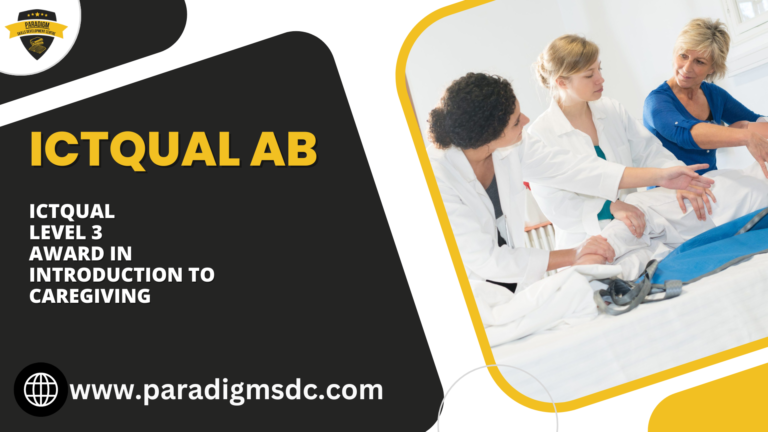Course Introduction
In the dynamic field of healthcare, providing excellent patient care extends beyond emergency situations. The ICTQual Level 3 Certificate in Ambulance Patient Care: Non-Urgent Care Services is designed to equip healthcare professionals with the skills and knowledge needed to deliver high-quality non-urgent care in an ambulance setting. This course emphasizes the importance of patient comfort and safety in scenarios that are not life-threatening but still require professional medical attention.
Course Overview
The ICTQual Level 3 Certificate in Ambulance Patient Care focuses on non-urgent care services within an ambulance setting. This course is structured to provide learners with an in-depth understanding of patient care management when dealing with less critical situations. The curriculum combines theoretical knowledge with practical skills to ensure that learners can confidently handle various patient care scenarios in a non-urgent context.
Course Study Units
- Introduction to Non-Urgent Care Services
- Patient Assessment and Care Planning
- Safe Patient Handling and Movement
- Communication Skills
- Legal and Ethical Considerations
- Infection Prevention and Control
- Basic Life Support and First Aid
- Operational Procedures and Protocols
- Health and Safety in the Workplace
Learning Outcomes
By the end of this course, learners will be able to:
Introduction to Non-Urgent Care Services
- Understanding the Role: Gain a comprehensive understanding of the role and importance of non-urgent patient transport services within the healthcare system.
- Types of Services: Differentiate between various types of non-urgent care services and the specific scenarios in which they are utilized.
- Healthcare System Integration: Understand how non-urgent care services integrate with other healthcare services to provide holistic patient care.
Patient Assessment and Care Planning
- Initial Assessment Skills: Demonstrate the ability to conduct thorough initial assessments of patients to determine their needs and condition.
- Care Planning: Develop and implement individualized care plans tailored to the specific needs of patients during transport.
- Critical Thinking: Apply critical thinking skills to evaluate patient information and make informed decisions regarding their care.
Safe Patient Handling and Movement
- Manual Handling Techniques: Master safe manual handling techniques to move and transfer patients, reducing the risk of injury.
- Equipment Proficiency: Effectively use patient transport equipment such as stretchers and wheelchairs, ensuring patient safety and comfort.
- Safety Protocols: Understand and adhere to safety protocols to prevent accidents and injuries during patient handling and movement.
Communication Skills
- Effective Communication: Develop strong verbal and written communication skills to interact effectively with patients, families, and healthcare professionals.
- Compassionate Interaction: Demonstrate the ability to communicate with empathy and compassion, providing emotional support to patients.
- Conflict Resolution: Employ techniques to manage and resolve conflicts or difficult situations that may arise during patient transport.
Legal and Ethical Considerations
- Legal Knowledge: Understand the legal responsibilities and regulations related to non-urgent patient transport, including patient rights and confidentiality.
- Ethical Practice: Apply ethical principles to ensure professional and moral conduct in all aspects of patient care.
- Decision Making: Make informed and ethical decisions in complex situations, balancing patient needs with legal and professional guidelines.
Infection Prevention and Control
- Infection Control Measures: Implement effective infection prevention and control measures to protect patients and staff from infections.
- PPE Usage: Properly use and manage personal protective equipment (PPE) to minimize infection risks.
- Hygiene Practices: Maintain high standards of hygiene and cleanliness in all patient transport activities.
Basic Life Support and First Aid
- CPR Proficiency: Perform cardiopulmonary resuscitation (CPR) and basic life support techniques proficiently in emergency situations.
- First Aid Skills: Provide immediate first aid for common medical emergencies encountered during patient transport.
- Emergency Response: Respond swiftly and effectively to medical emergencies, ensuring patient safety and stabilizing their condition.
Operational Procedures and Protocols
- Transport Procedures: Understand and follow standard operational procedures and protocols for safe and efficient patient transport.
- Documentation Skills: Accurately complete documentation and reporting related to patient transport activities.
- Process Improvement: Identify opportunities for improving operational procedures to enhance service delivery.
Health and Safety in the Workplace
- Workplace Safety Awareness: Recognize potential hazards in the patient transport environment and take proactive measures to mitigate them.
- Risk Assessment: Conduct thorough risk assessments to ensure the safety of patients and staff during transport.
- Health and Safety Compliance: Adhere to health and safety regulations and best practices to maintain a safe working environment.
Course Benefits
- Enhanced Skills: Gain specialized knowledge and practical skills in non-urgent patient care within an ambulance setting.
- Professional Development: Improve your career prospects in the healthcare sector by demonstrating expertise in a crucial area of patient care.
- Confidence Building: Develop the confidence to handle non-urgent care scenarios with competence and compassion.
- Real-World Application: Apply theoretical knowledge through hands-on practice and simulations to prepare for real-world patient care situations.
Who is This Course For?
The ICTQual Level 3 Certificate in Ambulance Patient Care: Non-Urgent Care Services is ideal for:
- Ambulance personnel and emergency medical technicians (EMTs) looking to specialize in non-urgent care.
- Healthcare professionals seeking to expand their skills in patient care management within a non-emergency context.
- Individuals interested in advancing their careers in the field of ambulance services and patient care.
Future Progression
Upon completing the ICTQual Level 3 Certificate in Ambulance Patient Care, learners may consider furthering their career by pursuing:
- Advanced Certification: Additional qualifications in advanced patient care, emergency medical services, or healthcare management.
- Specialized Roles: Opportunities in specialized non-urgent care roles, such as patient transport coordination or case management.
- Higher Education: Enrolling in higher education programs related to healthcare or emergency services for further professional development.
The ICTQual Level 3 Certificate in Ambulance Patient Care: Non-Urgent Care Services is a valuable credential for those committed to enhancing their skills and providing exceptional care in non-urgent ambulance settings. It paves the way for professional growth and a deeper understanding of patient care in various scenarios.







